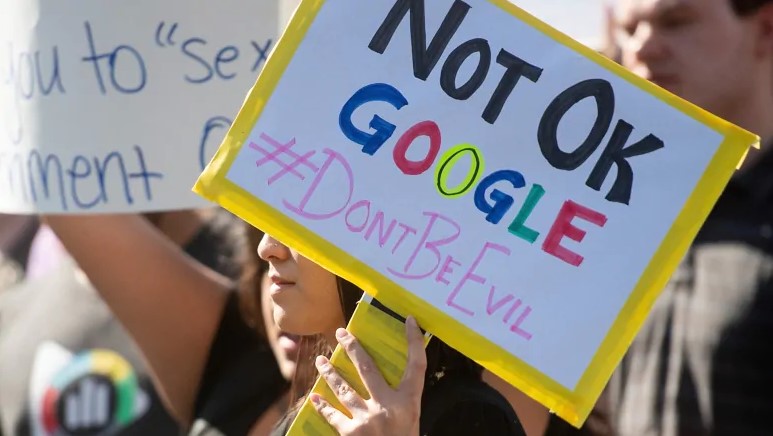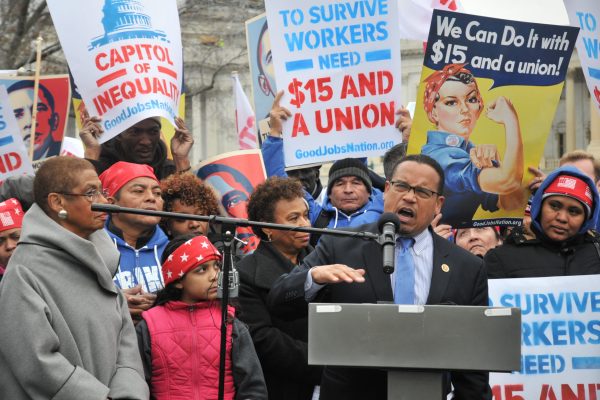 |
Editors’ Note: This essay is part of Boston Review's special project Democracy’s Promise. |
The tech giants are facing a moment of reckoning. Google, Facebook, Amazon, and Uber all grew explosively over the last decade, in part by delivering real convenience and benefits to consumers. For this we forgave their more venial sins, such as unfair competition, copyright infringement, data hoarding, and price discrimination. But recent years have brought one revelation after another around privacy issues—including Facebook’s sharing of data with the dark arts firm Cambridge Analytica—and ever-growing worries about the tech giants’ monopoly powers.
Workplace democracy barely registers in today’s public culture. It is high time to rescue that core commitment.
As a result, Mark Zuckerberg was hauled into Congress last year, and Senator Mark Warner has sketched an agenda to combat misinformation on social media platforms, and to better protect user privacy. More recently, Senator Elizabeth Warren has promised that her presidential administration would enact “big, structural changes to the tech sector to promote more competition — including breaking up Amazon, Facebook, and Google.” The approaches are complementary, but distinct: Warner seeks to regulate the tech giants’ activities in order to promote public values, while Warren seeks to limit and alter their fundamental powers.
There is also a third option, which would be just as momentous: workplace democracy. By which I mean, we should ensure that tech workplaces are governed in accord with basic democratic norms and ideals. In practice, there are many different ways to do that, ranging from greater protections for whistleblowers, to protections against forced arbitration, and even to unionization or other sorts of collective voice. What unites these approaches is a commitment to ensuring broadly distributed power in the workplace.
This notion barely registers in today’s public culture, of course. But for earlier generations of reformers and political leaders, from the Gilded Age through the New Deal and the postwar era, it was a given that “industrial democracy” was essential in a just and good society. Our economy and our workplaces have changed, but it is high time to rescue that core commitment and to consider how to make it real and vibrant once again.
• • •
Indeed, white-collar tech workers have increasingly been demanding a greater voice in their workplaces and even exercising democratic power through collective action. The trend has become so widespread that several organizers have started a folder on Github to track the growing number of collective actions. The most dramatic example was the 20,000-strong Walkout for Real Change at Google last November, which was one of the largest worker protests in the United States in a generation. Even more impressive, it was pulled together by workers who weren’t unionized, and it was coordinated across time zones—with participation from Haifa and Berlin to London and Dublin and, ultimately, New York and San Francisco.
The walkout followed revelations that Google had given generous exit packages to a few executives who had been credibly accused of sexual misconduct, including one who allegedly coerced a subordinate “into performing oral sex” in 2013. But the organizers tapped into broader discontent around gender and other issues as well as emerging folkways of protest at the company. In recent years, programmers and others had resisted Google’s efforts to develop a censored search engine for the Chinese market and had even refused to create a technology Google needed to win major military contracts.
Though it agreed to some demands, Google also made clear that it has a red line: it will not give workers an institutional voice in the company.
Within a week Google agreed to most of the walkout demands: promising to end forced arbitration in sexual harassment cases, to provide greater transparency around pay equity, and to permit workers to bring a coworker to meetings with HR when filing a harassment claim (which is a classic union tactic). And while it didn’t extend such protections to temporary and contracted workers—a group that includes both skilled workers and less-skilled service workers such as cleaners, drivers, security, and food service workers—it did later promise to ensure all those workers better pay and benefits, responding to further pressure by employees. Collective action still works.
Yet Google also made clear that it has a red line: it will not give workers an institutional voice in the company. After the initial walkout, it refused to budge on the organizers’ demand that it appoint an employee representative to its board. Still worse, the company has allegedly retaliated against two of the organizers, including by requesting that one of them take medical leave, despite the fact that she was not sick. That may have violated federal civil rights laws. Google has also been pushing for federal regulators to roll back employees’ rights to organize through company email and message boards, as the walkout organizers did. An adverse ruling on that question could stymie worker efforts both in and beyond the tech sector.
Google’s responses will be unsurprising to labor and employment lawyers. Workers often face retaliation for speaking up in the workplace, whether about sexual harassment or other working conditions—the New York Times just ran another blockbuster story alleging that workers at Boeing’s South Carolina plant were fired or demoted for calling out egregious production defects. Google’s steps are nevertheless ironic, since the company has called the internet “the most powerful vehicle of free expression the world has ever known,” and since it has a famously open internal culture, where workers can pose questions directly to upper management.
There is a vast difference between permitting feedback and sharing power—essentially the difference between benevolent authoritarianism and democracy.
But there is a vast difference between permitting feedback and sharing power, which is essentially the difference between benevolent authoritarianism and democracy. As Elizabeth Anderson has put it, companies in the United States are essentially “private governments” under the law, wielding enormous power over workers’ lives, both inside and outside the workplace, and yet treating them as subjects rather than citizens. To be sure, white-collar tech workers have it better than most. Their skills give them some protection against unfair treatment, even beyond what the law requires. But their workplaces are still not democratic in any reasonable sense of the word: they are not places where workers are guaranteed dignity and respect, or ultimately treated as equals, either under the law or in practice.
“Workplace democracy” need not denote a particular mode of governance; it simply means that day-to-day life in the workplace should better reflect the ethics and practices of a democratic society, including an absence of discrimination, basic interpersonal equality, and broadly dispersed and accountable power. The democratization of workplaces and firms will always be a question of degree in a capitalist society, and perhaps in any society with a complex division of labor. But they can clearly be made more democratic than they are today.
• • •
Like political democracy, workplace democracy has intrinsic benefits: workers who have a real voice at work are not dehumanized, not stripped of their autonomy, not alienated. It also has instrumental benefits. For example, worker voice can clearly help ensure compliance with basic employment laws and other regulations. Workers today have numerous statutory rights, including to minimum wages and overtime pay, safe workplaces, and equal opportunity. Yet regulators are often ill-positioned to detect misconduct, since they are not privy to the conversations occurring within the company’s halls, the firm’s payroll records, or its strategies for dealing with hate speech.
Under current law, employees can’t realistically take action against their employer in most cases.
As a result, to encourage enforcement, many statutes forbid employers from retaliating against workers who complain about violations. Yet as the #MeToo movement has illustrated, individual employees who complain about sexual harassment risk termination—and then, to compound the injury, must endure years of litigation to obtain damages or reinstatement. Plus, under the Supreme Court’s recent decisions, employers can funnel most disputes into arbitration processes they design, which often seem purposely designed to deter complaints.
The situation is different in the few remaining unionized workplaces. Employers typically can’t terminate unionized workers for speaking up without risking a strike or other collective pressure. Moreover, unions give workers an institutional voice, and a base of power that is independent of the company, not dependent on private litigation. As a result, compliance with statutory mandates tends to be significantly higher in unionized settings. Compensation concerns don’t predominate among white-collar tech workers, though many would surely want more humane schedules. But discrimination and harassment remain serious issues, and worker-led institutions could help root them out.
The benefits of greater enforcement aren’t limited to worker rights issues. Outside of Google, as Silicon Valley has moved more and more into physical technology, workers have increasingly raised concerns that a “move fast and break things” ethos is risking public safety. At Uber, several managers in the autonomous vehicle division had warned the group’s executives that its vehicles were unsafe and recommended that testing be scaled down, to no avail. A week later one of the autonomous vehicles struck and killed a pedestrian. John Carreyou’s book Bad Blood (2018) about the blood-testing startup Theranos contains many more chilling examples. Numerous employees realized the company was our age’s Enron: led by an illustrious board, selling magic, and fraudulent to its very core. Yet when they raised complaints internally, or considered going to regulators, the company struck back quickly and furiously, threatening them with litigation, or firing them but requiring them to sign broad non-disclosure agreements. Individual workers are essentially powerless to resist these sorts of employer tactics.
Worker voice can help ensure that companies act more in line with public values, regardless of what the law requires.
Worker voice can also help ensure that companies act more in line with public values, regardless of what the law requires. This is its second instrumental benefit and, again, seems especially important in Silicon Valley today. Indeed, given the inherent difficulties regulators face in trying to govern new technologies, Veena Dubal and others have recently argued that tech workers are the only group that can effectively protect consumers and the public against their companies’ worst impulses. Again, there are a number of examples. Beyond Google, 450 Amazon employees signed a letter to CEO Jeff Bezos in October demanding that the company cease selling its facial recognition program, Rekognition, to law enforcement agencies, given evidence that the program (like many other AI systems) tended to misidentify individuals with darker skin. Some also pushed back against the company’s decision to bid on a massive, $10 billion contract with the Pentagon to provide a single-source cloud computing platform which, as one reporter put it, “would involve using artificial intelligence to make the U.S. military a lot deadlier.” Others are listed in the Github folder noted above.
This ferment among tech workers—and their fear of retaliation—is indicative of our political-economic moment. With the decline of unions and the erosion of the regulatory state, corporations face little countervailing power. As institutions, they then face enormous incentives to act badly—some would even say, sociopathically. Leaders such as the Google executives accused of sexual assault may enjoy relative impunity. Or companies may align with authoritarian governments, or simply disregard the clear and immediate harms their products cause. Revelations of malfeasance often lead to public outrage and can even topple the likes of Uber’s Travis Kalanick. But they rarely lead to institutional change.
As in the Gilded Age and after, the remedy to the public harms of capitalism is to build and exert countervailing power.
New terms for our emerging political economy abound, including “platform capitalism,” “data capitalism,” and “surveillance capitalism.” The modifiers are apt, but they can also deflect attention from the modified term: capitalism. When unchecked, it builds “dark satanic mills,” in William Blake’s memorable phrase, which today produce both undeniable goods (effortless communications, access to knowledge, electric vehicles, the promise of far more efficient resource management) and substantial public harms (the destruction of local businesses, armies of low-wage workers, online radicalization, major threats to safety). As in the Gilded Age and after, the remedy is to build and exert countervailing power, both via the state (through policies such as Warren’s) and through workplace democratization.
• • •
Three sets of reforms could advance that goal. The first are straightforward: workers need stronger protections for whistle-blowing and for collective action around workplace matters, so that the organizers of the next Google walkout don’t fear or suffer retaliation. Lawmakers could also guarantee them just cause prior to termination, such that an employer would need to show they were underperforming or had violated work rules. The absence of such rights chills all manner of speech and protest.
Unions are nearly impossible to establish, and even once established, they deliver only weak democratic rights. This is a core failure of our labor law.
The second would revitalize a classic means of ensuring worker voice and power: unions. While there are many reasons to do this, particularly for low-wage workers both in Silicon Valley and beyond, unionization of white-collar tech workers seems quite unlikely, for a few reasons. Our labor law makes it exceptionally hard to organize even in the best of circumstances, in part because it tolerates or encourages substantial (and often illegal) resistance from managers.
And even if white-collar tech workers did unionize, they wouldn’t necessarily gain a voice in some of the issues that concern them, such as the ethics of consumer data practices and military contracting. A foundational set of doctrines in our labor law give companies very broad rights to make decisions about corporate strategy and other managerial matters without consulting or bargaining with unions. In other words, unions are nearly impossible to establish, and even once established, they deliver only weak democratic rights. This is, to be clear, a core failure of our labor law, whose weaknesses have been extensively documented by scholars over the years. As I argued last summer, the time is ripe to think about fundamental labor law reform, particularly to enable low-wage workers to unionize and exercise power.
A third and complementary approach—which strikes me as especially promising for white collar tech workers—would be to guarantee workers some collective voice regardless of whether they unionize. There are successful models of this approach in other dynamic capitalist economies. For example, various European countries—Germany most notably—guarantee workers seats on corporate boards. This was a demand of the Google organizers, and the idea is gaining traction in U.S. policy debates, given the lack of other outlets for worker voice. Senator Warren introduced legislation last summer that would mandate employee board seats at large corporations, and the Roosevelt Institute been pushing the idea.
We should guarantee workers some degree of collective voice regardless of whether they unionize.
German workers, and workers in some other European countries, also have a guaranteed collective voice at the workplace level. In Germany this involves “works councils,” which can consult or bargain over matters including scheduling, workplace safety, vacation policies, and even technological change. Historically, works councils have been most effective when workers are unionized, so that they do not simply become a tool of management; they are currently unlawful in the U.S. for precisely that reason. But there may be ways for lawmakers to bring the principle—that workers should be guaranteed a collective voice at work—into the U.S. context without undermining unions.
For example, Congress could mandate that certain employer policies would be legally binding only if they were developed in consultation with employees, acting through representatives. Take scheduling: workers could have no obligation to work overtime hours unless they had agreed to a scheduling policy after collective consultation. Or Congress could require that employers develop internal processes for investigating sexual harassment in conjunction with employees. Still more ambitiously, Congress could mandate that employees be given a voice in certain important business decisions, such as whether to enter a partnership or carry out a merger, or which product lines to develop.
The aspiration, as should be clear, is to enable workers to build robust democratic institutions of their own. To that end, representatives for such workplace bodies could, in turn, be chosen on an annual basis in all major companies, on the same day each year. Some have suggested as much in the union context, but the idea may be even more germane for these non-union (or quasi-union) forms of representation. Even if collective consultation is mandated by law, ambitious workers will act entrepreneurially within any consultative bodies and will surely establish networks of such groups that cut across firms or even sectors. Such a system could also encourage unions to take on the role of helping elected representatives to navigate the new regime, which could in turn help set the stage for further organizing.
Our law does not require companies to treat either employees or consumers as fellow citizens. But it could.
A similar approach could be used in the context of consumer data protection and the ethics of AI, where democratic commitments suggest that companies—or even groups of companies—should be setting policies in conjunction with both worker representatives and consumer or public representatives. This would represent a twist on teachers unions’ recent “bargaining for the common good” strategies, which “give community stakeholders a voice at the bargaining table.” That has meant working together with community allies to develop bargaining demands, then targeting austerity politics and the power of the finance sector—in one case even demanding that the school board cease doing business with banks that foreclose on students’ families. Such a tripartite process may be especially helpful around data and AI. Tech workers know much more about such issues than the general public, and yet the public bears the costs. It will be far more difficult to get off the ground, however, without worker-led institutions.
As John Dewey once wrote, the “democratic way of life” requires that “all those who are affected by social institutions must have a share in producing and managing them.” Our law does not require companies to treat either employees or consumers as fellow citizens. But it could.








